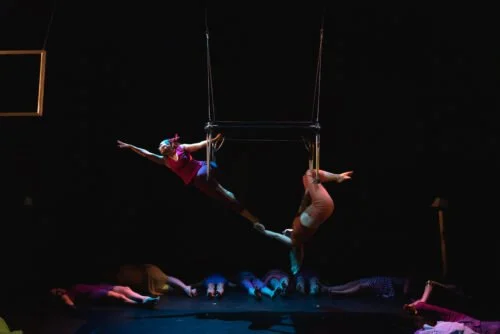Taking circus seriously for health and wellbeing outcomes
Vulcana Circus is a not-for-profit arts and recreation organisation that works with the circus traditions of inclusiveness, strength, excitement and courage to transform and empower individuals and communities. In this week’s post, they argue for greater recognition of the role of artistic and creative practices in achieving health and wellbeing outcomes.
Image credit: Jade Ellis
If we ask you to think about physical activity or exercise - what comes to mind? Are you thinking about a sporting field, bats and balls, team victory and oranges at half-time? Or are you thinking about a gym, with weights and treadmills and blasting music?
For some people, these thoughts will have positive associations, but for others 'physical activity’ has connotations of exhaustion, exclusion and struggling through compulsory school PE classes.
But what if ‘physical activity’ brought to mind community, belonging, expression and creativity?
Social circus programs provide a wide range of physical health benefits such as strength, mobility, coordination, balance, and gross and fine motor skills. Circus draws on a wide range of physical skills, so all participants will discover unexpected abilities, and be constantly challenged to develop and improve. Participating in a program or working towards a performance provides structure and commitment for regular exercise.
Circus is also a site for teamwork and trust building. The practice of circus values participants’ eccentricities, preferences, talents and modes of expression, while at the same time encouraging them to rely on and interact with other people to accomplish new skills. Evidence from Social Circus: Building Resilience in Marginalised Youth (Stevens et al., 2019) shows that circus-based programs improve self-esteem, motivation, social cohesion and resilience. Participants report a strong sense of belonging, achievement, and emotional safety—all essential protective factors for mental wellbeing.
Circus can provide a safe, creative space, where individuality is celebrated and physical movement is joyful. This safety and joy can be particularly valuable for those who have experienced discrimination, trauma or who struggle to find their place in more traditional sporting options. An example is our Circus in a Tea Cup program. The 2024 performance brought together 13 survivors of domestic violence and 6 members of the Vulcana community together to devise, rehearse and present a new performance work.Through the program, participants reported building a sense of their own strength and bodily autonomy, and greater trust in physical interactions with other people.
Repeated studies have supported the role of social circus in health and wellbeing outcomes. A meta-study of over 60 ‘circus as a health intervention’ studies indicated positive outcomes across emotional, psychological, physical and social wellbeing indicators (Coulston et al 2023). Studies have also found that the social return on investment of social circus is $7 for every $1 invested (eg McGrath et al 2019).
In our siloed policy environment, sport and fitness are often put in a different box to arts and creativity. Mental health, physical health, and social inclusion are considered separate problems in separate boxes, funded by separate departments. But it’s time to recognise the importance of holistic wellbeing, and understand that artistic and creative practices can be an effective health intervention.
Author: Vulcana Circus
Moderator: Ruth Pitt

